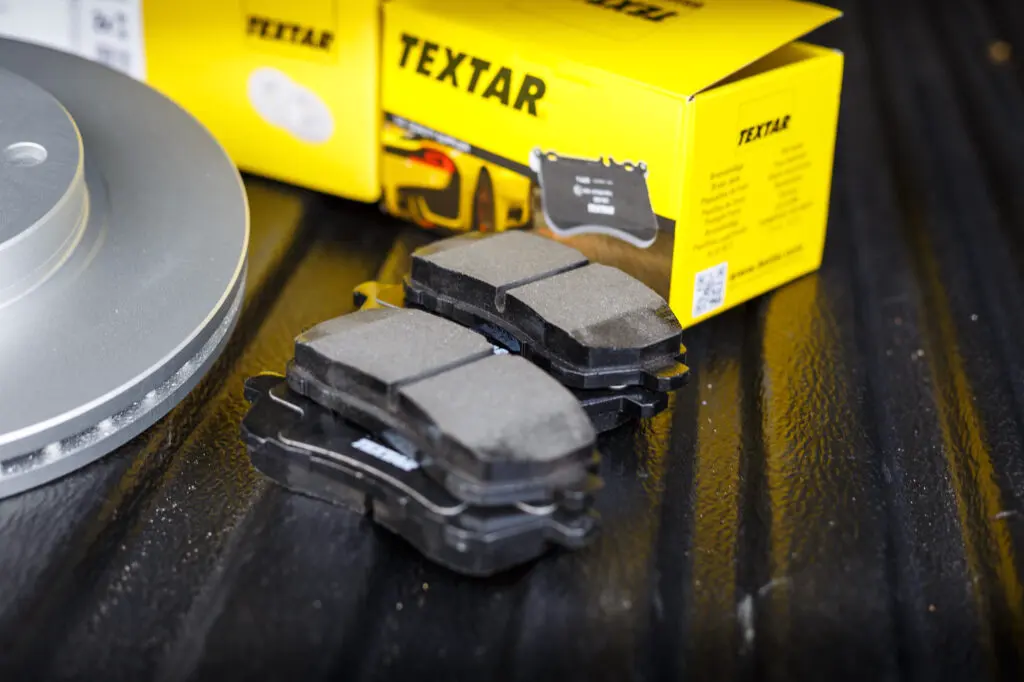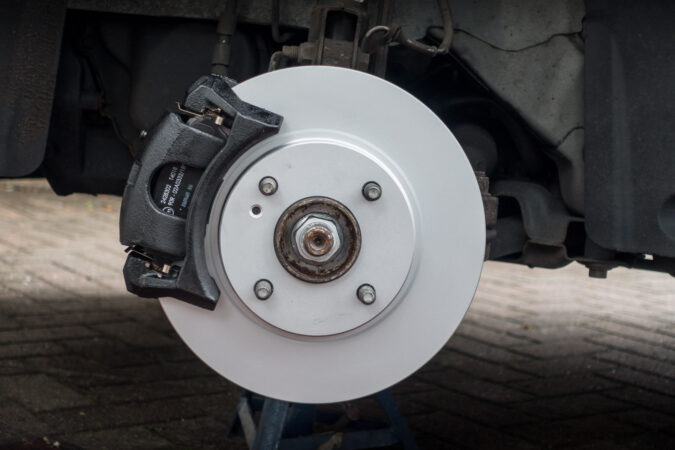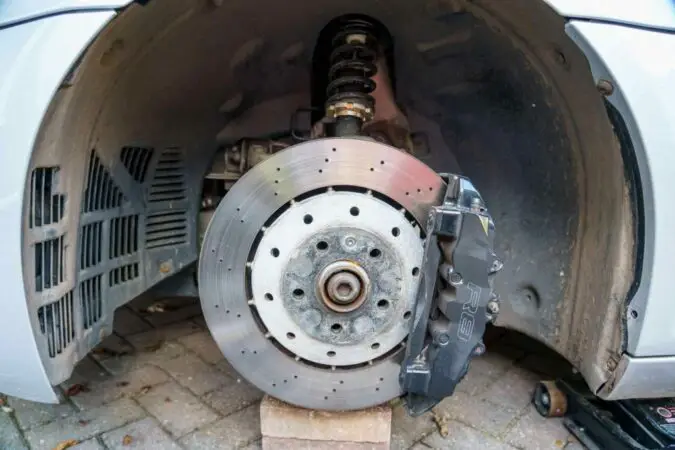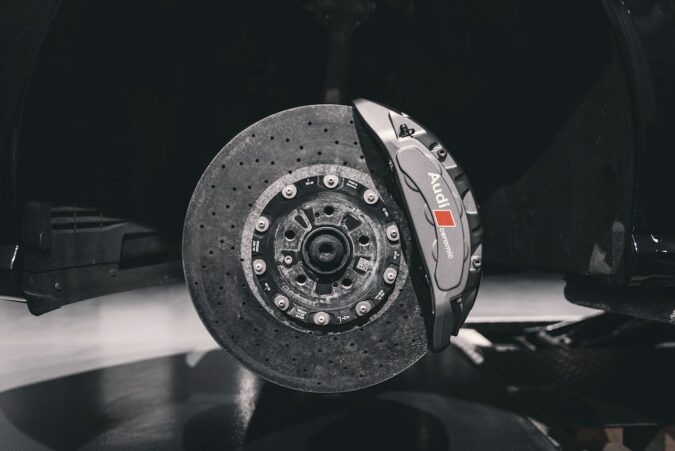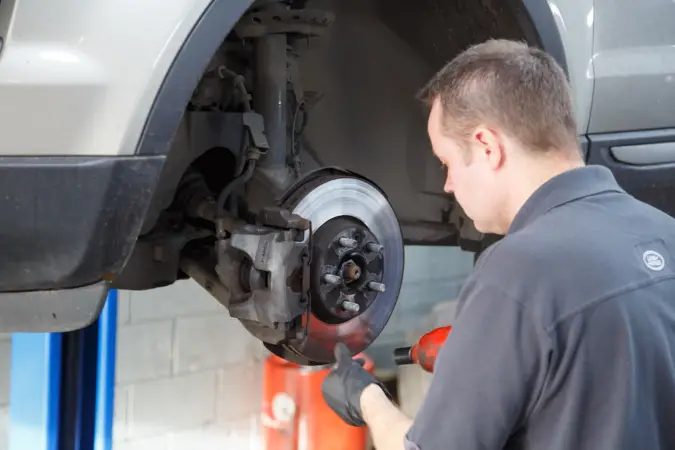So, you just overhauled the brake system of your beloved vehicle. But, have you been hearing worrying noises since then? Are your brakes squeaking after new pads? Well, you are not the only one suffering from this issue. In fact, this is one of the most common issues related to a vehicle’s brakes.
- How Do Car Brakes Work?
- Common Causes For Squeaky Brakes
- Fixing Squeaky Brakes
- Final Conclusion
- Frequently Asked Questions (FAQs)
We all have heard squeaking brakes at least once in our lifetime. As the brakes are a vital vehicle system, hearing noises from them is enough to worry even die-hard gearheads. If you were looking for an answer to why this happens, then you have come to the right place.
After going through this article, you’ll know exactly what causes the brakes to squeak after changing the pads. Not only that, we will tell you ways to avoid this from happening in the future as well.
So, with that out of the way, let’s get to it. As a start, we thought of discussing the brake system and its components with you.
How Do Car Brakes Work
As we mentioned earlier, brakes are essential for a vehicle to function properly. Each car comes with brakes on all of the wheels, but the front wheels do the most work when bringing the vehicle to a stop. This is mainly due to inertia, as the weight of the vehicle transfers to the front of the vehicle under braking.
The brake system of a vehicle consists of several main components. All these have to work together in order for the brakes to work perfectly. The main parts of the braking system include,
- Master Cylinder
- Brake Booster
- Brake Hoses
- Brake Pads
- Calipers
- Brake Fluid
- Rotor
Now, let’s take a look at each of these components. This will help you understand what they do and how they help to slow down your vehicle.
1. Master Cylinder
As the name suggests, the master cylinder is perhaps the most important part of the braking system of a car. This is the part that sets the braking process in motion. The master cylinder is the part that activates when you press the brake pedal.
There is a brake fluid reservoir situated on top of the master cylinder, and it is filled with brake fluid. Once the brake pedal gets depressed, hydraulic pressure created by the master cylinder pushes this brake fluid into each wheel.
There, the fluid activates different components, which eventually slows down the vehicle and brings it to a stop.
2. Brake Booster
In the same way as the master cylinder, the brake boosters are another important part of power brake systems. Multiplying the force applied by the brake pedal onto the master cylinder is the main responsibility of the brake booster.
Most modern vehicles come with brake boosters that are boosted through a vacuum system. This vacuum is produced by the vehicle’s engine, which multiplies the brake force. Without the brake boosters, drivers would have had to apply extra force in order to slow their vehicles down.
3. Brake Hoses
Hoses and lines are an important part of the braking system. They enable the brake fluid from the master cylinders to flow into the calipers on the wheels. Brake lines are made of metal, and are attached to the vehicle body.
On the other hand, brake hoses are made of rubber. This allows the wheels and suspension to move independently. Brake hoses are attached to the ends of the brake lines, and these two components work together to ensure the flow of brake fluid.
4. Brake Pads
If you own a vehicle with disc brakes, then you would have surely heard of brake pads. These are mostly made of metal. When the driver applies the brakes, the brake pads rub against the rotors. This results in friction, which slows the vehicle down.
On the other hand, drum brake systems employ brake shoes for this same operation. However, these systems create friction by pressing the brake shoes against the drum’s interior.
Brake pads are the main culprits behind squeaking noises. We will tell you more about why brakes make squeaking noises after new pads later on in this article.
5. Calipers
Each wheel of a vehicle with a disc brake system contains a brake caliper. Essentially, it acts as a clamp, which is placed on top of the brake disc or rotor. When the brake pedal is applied, the pistons inside the calipers activate. This action results in the brake pads being pushed against the brake rotors.
6. Brake Fluid
Brake fluid is the lifeblood of your vehicle’s braking system. It is what activates all the mechanical brake components. As we said earlier, brake fluid is stored in a reservoir near the master cylinder.
The brake fluid flows through the brake hoses and lines into the brake calipers at the wheels. Other than activating the brake pads, the brake fluid has some other purposes as well. This fluid lubricates the whole braking system, keeping it in the best shape possible. Additionally, the brake fluid comes with anti-corrosion additives. These prevent the various brake components from rusting.
7. Rotor
The final components we will be discussing are the brake rotors. The rotor is a disc made of metal, and it is directly attached to the wheel hub. As a result, it rotates along with the wheel itself. When the brakes are applied, the pads squeeze against the rotor, slowing the wheels down in the process. However, brake rotors are only found on vehicles with disc brakes.
On the other hand, vehicles with drum brake systems have a brake drum that rotates with the wheels. The wheel cylinders and brake shoes are housed inside the drum. Also, to learn more about this section of your car, check out our write-up on what a wheel hub replacement entails.
The way brake shoes work is similar to that of brake pads.
Now, you know all about the different parts of a vehicle’s braking system. Next, we will take a look at the main causes of squeaking brakes. Noises coming from the brakes are never a good sign, and knowing the most common causes of squeaking brakes will surely help you to diagnose the issue faster and easier.
Squeaky Brakes
Squeaky brakes can be the result of a number of different issues. Recognizing the source of the issue is important before performing repairs. Some of the most common causes of squeaky brakes include,
- Wet Brake Rotors
- Bad Wheel Bearings
- Leaving The Brakes On
- Not Using The Car Enough
- Stones Between The Rotor And Caliper
- Glossed Brake Pad
- Issues With Lubrication
- Worn Brake Shims
- Loose Parts In The Braking System
Let us take a look at how each of these issues causes squeaky brake pads.
Brakes Squeaking After New Pads, Causes #1 – Wet Brake Rotors
When it comes to squeaking brakes, wet brake rotors are one of the most common sources of the issue. This can happen to both new and old brake rotors.
Once the brake rotors get wet, a thin layer of rust forms over them. But, when the brakes get applied, this rust breaks down into small particles and gets embedded into the brake pads.
Once these rust particles get pressed against the brake rotor, it results in squealing sounds.
However, this is not a permanent issue. After several hard stops, the sound will probably go away on its own. But if that doesn’t happen, the issue might be related to a more serious matter.
Brakes Squeaking After New Pads, Causes #2 – Bad Wheel Bearings
Faulty wheel bearings are another issue that results in squeaking brakes. If you hear grinding noises and vibrations on top of squeaking noises, it is worth looking at the wheel bearings. Damaged or worn 0ut wheel bearings should be replaced by new ones in order to get rid of the squeaking noises permanently.
You can find out more in our guide on how many wheel bearings does a car have.
Brakes Squeaking After New Pads, Causes #3 – Leaving The Brakes On
On top of causing squeaking noises, leaving the brakes stuck in the on position damages the vehicle as well. You see when the brakes are stuck on, the calipers inside them are also lodged in the applied position. This causes the brake pad to be applied at an angle to the brake rotor.
Brake pads that are stuck against the rotor cause several issues like burning smell, glazing as well as noisy sounds coming from them. Although it is possible to lubricate and release stuck caliper pins, most of the time you will have to completely replace the components. Additionally, you may have to replace the brake rotors and pads as well.
Brakes Squeaking After New Pads, Causes #4 – Not Using The Car Enough
Not using the vehicle enough and leaving it parked for long periods at a time is harmful to its reliability. While it is true that brake pads have a lifespan of 20,000 miles, leaving them unused can severely shorten that.
This is due to rust, as bad weather conditions cause corrosion to easily form on idle vehicles. The best way to avoid this issue is by driving your vehicle regularly and carrying out the recommended maintenance procedures.
Brakes Squeaking After New Pads, Causes #5 – Stones Between The Rotor And Caliper
Sometimes, the cause of squeaking brakes can be just a small rock. Debris such as stones can get lodged between the brake rotor and caliper, resulting in squeaking, grinding noises, and scraping to happen once the brakes get applied by the driver.
Brakes Squeaking After New Pads, Causes #6 – Glossed Brake Pad
The heat from a hard brake application can lead to a glazed or glossy finish to be left behind on the brake pads. This finish is another cause of squeaking sounds. Removing the pads and sanding them down to remove the smooth surface is the best way to fix this issue.
On the other hand, the brake rotors can get glazed as well. Although rotors are designed to last around 30,000 to 70,000 miles, imperfections can still form on them due to various issues. If you hear a squeaking noise but your rotors are relatively new, resurfacing them might be the best course of action.
Resurfacing brake rotors does not cost a fortune. Most shops would resurface them for only around $10 to $15. Not only that, but you even resurface the brake rotors by yourself. All you have to do is to remove the wheels and sand down the rotor surface with a piece of 1500-grade sandpaper.
Brakes Squeaking After New Pads, Causes #7 – Issues With Lubrication
Good lubrication is essential in order for the brakes to function as intended. In fact, components of the braking system including the brake pads and slider pins require lubrication.
First, let’s focus our attention on brake pads. Anytime new brake pads are installed, brake caliper lube should be applied to their backsides. This prevents brake squeaking. However, if the lube is not applied, the metal parts of the brake pads and rotors rub against each other once the brakes are applied.
On the other hand, brake caliper pins should also be properly lubricated before reinstalling brake pads. You can find these pins on either side of the caliper. Improper lubrication of these parts leads to brakes squeaking at low speeds.
Brakes Squeaking After New Pads, Causes #8 – Worn Brake Shims
Each time that you replace the brake pads, you should remember to replace the brake shims as well. If not, they can wear down to the point that they start making contact with the brake rotors and other metal components. Unsurprisingly, metal-on-metal contact leads to various sounds, including squeaking noises.
Brakes Squeaking After New Pads, Causes #9 – Loose Parts In The Braking System
Finally, the braking system’s loose pads, discs, and hoses can shake, rattle, and even cause squeaking noises. So, it is important to go over all the parts after a brake pad replacement. Or, if you want to learn how to install new brake pads DIY and proceed with replacing brake pads. You can also learn more in our guide on how long do brakes last on a car and how to replace brake pads.
Brakes Squeaking After New Pads, Causes #10 – Improper Brake Pad Installation
In certain cases, the squeaking noise after the new brake pad installation could be the result of improper installation. If the brake pads aren’t seated correctly, they may not contact the rotor uniformly. Uneven pressure on the rotor will lead to vibrations that can cause that familiar squeak. Always ensure that the pads are installed correctly and the caliper bolts are torqued to the manufacturer’s specifications.
Brakes Squeaking After New Pads, Causes #11 – Using Low-Quality Brake Pads
Opting for low-quality brake pads might save you money upfront, but they can lead to issues, including squeaking. Premium brake pads usually come with features designed to reduce noise, such as shims, slots, and chamfers. When considering brake pad replacements, it’s wise to invest in high-quality pads that reduce the chances of unwanted noises.
Brakes Squeaking After New Pads, Causes #12 – Mismatched Brake Pads and Rotors
Matching your brake pads with the right rotor type is crucial. For instance, using aggressive, track-oriented pads on regular street rotors might cause squeaking. The intense grip can result in higher vibration levels, which often translates into noise. Ensure that the brake pads are suitable for the type of rotors and intended use of the vehicle.
Brakes Squeaking After New Pads, Causes #13 – Warped Brake Rotors
Over time, due to excessive heat and wear, brake rotors can warp. When this happens, the rotors will no longer have a flat surface, leading to uneven contact with the brake pads. As a result, you may hear a squeaking or even a pulsing sensation when braking. Warped rotors may need to be resurfaced or replaced altogether.
Brakes Squeaking After New Pads, Causes #14 – Using Brake Pads Meant for Another Climate
Brake pads are designed for specific climates and conditions. Using a brake pad designed for cold climates in a hot environment can lead to excessive heat buildup, which can cause squeaking. Similarly, pads meant for warm climates might not provide adequate friction in colder conditions, resulting in noise.
Brakes Squeaking After New Pads, Causes #15 – Aging Brake Hardware
While brake pads and rotors are the most commonly replaced parts, the rest of the brake hardware can wear out too. Aging hardware, like springs and clips, might lose their tension or become corroded. This can allow for excessive movement or vibration within the brake assembly, leading to squeaking.
Brakes Squeaking After New Pads, Causes #16 – Not Breaking In New Brake Pads
When you install new brake pads, they need a proper break-in or “bedding-in” process. This involves a series of hard and soft stops to transfer a layer of brake pad material onto the rotor, allowing them to work harmoniously. If this isn’t done, you might face issues like reduced braking efficiency and, of course, squeaking.
Brakes Squeaking After New Pads, Causes #17 – Contaminated Brake Pads
Brake pads can become contaminated with oil, grease, or brake fluid. When this happens, their friction properties change, potentially leading to noises when applied. Always handle brake pads with clean hands and avoid getting any foreign substances on the pad’s friction surface.
In conclusion, while some causes of brake squeaking are minor and might resolve themselves over time, consistent squeaking after a brake pad replacement signifies that there’s something amiss. Regular inspections and choosing high-quality components can keep your braking system in top shape and squeak-free.
Sometimes squeaking noises can happen even when the brakes are not applied. Do you know the reason for this? If the answer is no, you should keep on reading.
Squeaking Noise While Driving But Not Brakes Applied
Apart from the braking system, several other problems like tire issues, suspension problems, loose belts, and steering issues can result in your vehicle making squealing noises while driving even when the brakes are not applied.
1. Tire Issues
Tires are a crucial part of any vehicle, and they should be checked frequently for wear and tear. Uneven tread wear on the tires often results in squeaking noises coming from them. You can easily spot uneven tread wear, but you can also use a tire gauge for more accurate measurements.
Often, the cause of uneven tread wear and the resulting squeaks are not the tires themselves. Instead, they are mostly caused by underlying alignment or suspension problems.
Incorrect pressure inside the tires also causes them to make squeaking noises. If the pressure inside one tire is different from that of others, the balance of the vehicle may be disturbed. Apart from causing noises, uneven pressure causes wear and tear on the tires as well.
2. Alignment And Suspension Problems
There are many elements in the vehicle suspension system. The CV joints, U joints, struts, and shock absorbers are some parts that are known to develop issues over time. Damage from accidents or simply a lack of lubrication causes these parts to develop faults.
On the other hand, the struts and shock absorbers wear out over time. When this happens, it has a significant effect on the vehicle’s alignment. Signs of improper alignment include rough ride quality, steering wheel wobble, and the vehicle pulling to one side.
3. Steering Issues
Low steering fluid levels can also cause the vehicle to make squeaking noises. Additionally, problems with the various seals, ball joints, and other parts of the steering system also cause the vehicle to squeak while being driven.
4. Loose Belts
Your vehicle relies on belts for some important functions. Mainly, there are two types of belts in any vehicle. They are the timing belt and the serpentine belt. However, when it comes to squeaking noises, the serpentine belt is what requires our attention.
Also called the “drive belt”, the serpentine belt connects multiple parts of the engine including the water pump, AC fans, alternator, and crankshaft.
Generally, this belt has a lifespan of around 100,000 miles, after which it starts to loosen due to wear and tear.
Sudden acceleration and decelerations as well as turning on the air conditioner can cause the squeaking sounds to get even louder. Out of all these factors, the air conditioner puts the most stress on the serpentine belt. Additionally, the belt also tends to squeak in wet weather conditions due to excess moisture.
New Brakes Squeaking
On some occasions, even brand-new brakes make squeaking noises too. This usually happens when you have replaced the brake pads with ones that have a high metal content. Brake pads are made by mixing several materials. Some of the common ones used include iron, copper, graphite, and steel. When the ratio of metal relative to the other materials is too high, it can result in squeaking noises.
These days, you can find brake pads made from organic materials out on the market. Manufacturers use rubber, glass, and heat-resistant resins to make these pads. While it is true that these pads have a lower metal content, their stopping power leaves much to be desired.
Heat also plays a part in making new brakes squeak. Riding the brakes, driving up mountains, or towing right after a brake pad installation are things we don’t recommend, as they can put too much pressure on the brake pads and cause them to overheat.
On top of making squeaking noises, overheated brakes have less stopping power as well. This is a safety risk and should be avoided at all costs. Contrary to popular belief, brake pads have a break-in period too. This is extra important if you replace the brake rotors along with the pads. You can speed up the break-in process by relatively braking slowly for a few minutes.
Squeaky Brakes Fix
Depending on the cause, there are several methods you can try to fix squeaky brakes. If moisture is the culprit, the easiest way to stop the squeaking is to drive the vehicle for a few miles. This causes the moisture to evaporate, getting rid of the squeaking in the process.
As we discussed earlier, excessive heat causes the brakes to squeak as well. If this is the case, pull over to the side of the road to let the brakes cool down. This will fix the squeaking, and improve the braking performance as well.
Other than the methods mentioned above, there are a few other fixes you can try as well. These include braking in the pads, replacing the pads for new ones, repairing or replacing the brake calipers, and resurfacing the rotors.
Brakes Squeaking After New Pads: In Conclusion…
Brakes squeaking after new pads are a problem that can be caused due to different reasons. Moisture, bad wheel bearings (which you can diagnose by figuring out how to tell if wheel bearing is bad or if you have a loose wheel bearing), worn-out shims, heat, or even excess metal in the brake pads all result in squeaky brakes. Before applying a fix, it is important that you identify the exact cause, as it saves both time and money.
Brakes Squeaking After New Pads: Frequently Asked Questions (FAQs)
Here are some popular frequently asked questions about your brakes squeaking after new brake pads…
Why Are My Brakes Squeaking
A number of issues can lead to squeaky brakes. Some of the most common ones include inadequate lubrication, low-quality pads, caliper pin issues, and wet brake rotors.
How To Fix Squeaky Brakes
It is important to identify what causes the squeaky brakes before trying to fix them. Changing out the brake pads, regularly lubricating the brakes, resurfacing the rotors as well as replacing the caliper pins are some fixes you can try to get rid of the squeaking noises.
How To Stop Brakes From Squeaking
Heat is one of the most common reasons behind squeaking brakes. Stopping the vehicle for a short while to cool off the brakes is the easiest way to prevent the brakes from squeaking.
Why Are My Brakes Grinding After New Pads And Rotors
A lack of lubrication, moisture, or faulty brake clips can all result in the brakes grinding after replacing pads and rotors. We recommend getting the brakes checked by a mechanic immediately to prevent further damage.
Why Does My Car Squeak When I Drive
Squeaking is one of the most common noises many drivers hear during their commutes. Misaligned tires, steering problems, and suspension issues all lead to squeaking noises.

